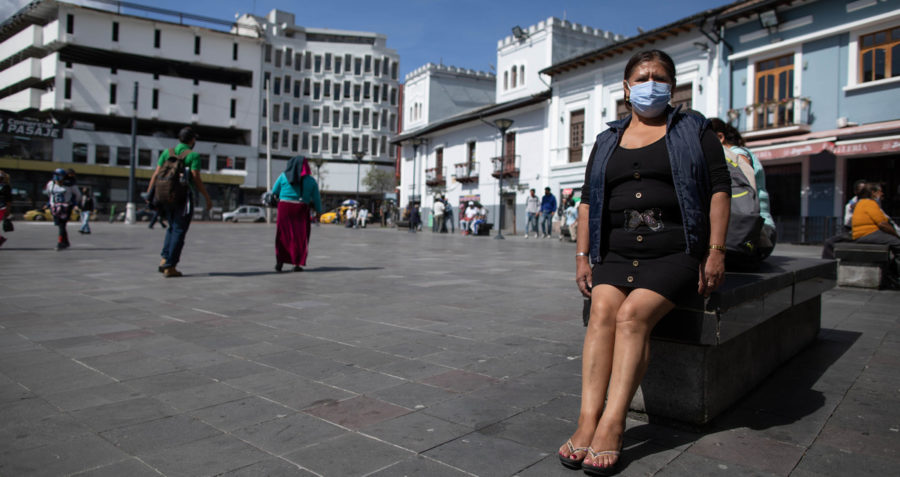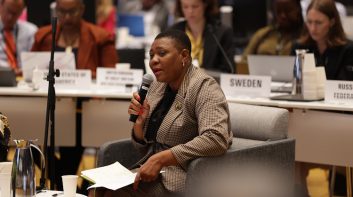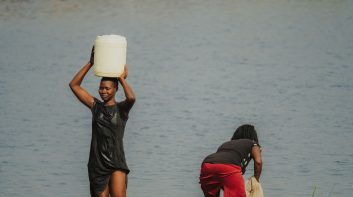How to tackle COVID-19 and HIV stigma
 © Frontline AIDS/Keoma Zec 2020
© Frontline AIDS/Keoma Zec 2020
When someone is judged, attacked or discriminated against because of who they are or what they do, the consequences can be far-reaching.
In Ecuador, as in many countries, people who experience stigma and discrimination, such as trans women, sex workers and gay men, often avoid HIV services despite being far more at risk of HIV than other people. This vicious cycle helps to fuel the country’s HIV epidemic.
“Doing this job is quite difficult sometimes,” says Suzanna (her working name), a sex worker from Quito. “Being judged by people, being called names or even being rejected by certain family members – stigmatisation of sex workers – sadly enough, is something that probably will always be part of my life.”
People who are marginalised experience many layers of stigma. Harmful social expectations about how people should behave, linked to things like gender, sexuality or age, can lead to judgement and abuse, as can being associated with heavily-stigmatised viruses like HIV. Sometimes, people internalise this stigma, which can damage their mental health and push them further away from support and services and into situations where their risk of contracting HIV increases.
Multiple stigmas
“People living with HIV in this country face multiple stigmas,” explains Angel Joiset Talis Lanz, who works for Kimirina, a Frontline AIDS partner in Ecuador. “Within the family, people living with HIV are often rejected and treated like an outsider, even more so if one is homosexual because then people are even more stigmatised.”
Kimirina’s mission is to support people who are marginalised to exercise their basic rights to health services and information by providing community-led, non-stigmatising HIV services and supporting other community-based organisations to do the same.
It is directly addressing stigma and discrimination in a number of ways, including by providing counselling for people living with HIV and working with the wider community to address harmful attitudes towards people from groups who are marginalised.
Breaking barriers
“People who are affected with HIV face a lot of stigmatisation, politically as well as socially, which is where Kimirina has succeeded in breaking barriers and discrimination to some extent,” says Dayana Ashley Quimi De Los Santos, who conducts HIV and STI testing for Kimirina in Quito. As a trans woman, Dayana says she understands how important it is for people who are marginalised to have somewhere to go where they can access HIV and sexual and reproductive health services without being judged.
“The fact they get served here by people who are gay or trans as well makes a huge difference,” she says. “They will feel more at ease coming here and asking certain questions.”
Angel says one of the biggest differences Kimirina is making is through the information it provides, which is helping dispel the fears and myths that perpetuate HIV-related stigma.
“People who are ignorant about the situation and the virus [HIV] will be very afraid, but when they are informed they won’t be as afraid, which to me is the most important part of my job and how I make a difference,” he says. “Many people think touching someone with HIV will give them the disease. As human beings naturally we are afraid of what we don’t know.”
Angel’s advice to people living with HIV is to communicate. “Information is key,” he says. “Once people around you know more about what you are living through it will be a lot easier to get their support in many ways.”
The parallels between COVID-19 and HIV
When COVID-19 emerged last year, many warned of the parallels with the HIV epidemic – those least in a position to avoid infection are sometimes blamed for contracting and transmitting it.
“Stigma and discrimination manifest themselves differently, depending on the context and populations, but there are some aspects that remain constant,” says Jimmy Medina, Kimirina’s project coordinator. “HIV-related discrimination is due to fear, misinformation and the fact that it is viewed through a ‘morality’ lens. With COVID-19, accusing certain groups of being responsible for its spread can also be harmful as it causes an increase of stigma towards some groups and reduces the feeling of risk in others who think it does not concern them.”
During the pandemic Kimirina has provided communities who are marginalised with information explaining what COVID-19 is and how it is spread. This helps to stamp out misinformation and saves lives. Kimirina’s mobile testing units provide access to COVID-19 tests alongside HIV and STI testing, while yoga, meditation and coaching sessions ensure people’s mental health needs have not been forgotten.
“The mental support has been great for me,” says Suzanna. “I was in a very bad place mentally but because of the meditation sessions and counselling sessions I look at life in a more positive way. Life is good again and I don’t want to die anymore. Sometimes, before I had the support of Kimirina, I couldn’t find a reason to live, but they helped my find my way again.”
Further Reading
Tags
COVID-19GenderHIV preventionHIV treatmentLGBTPeople who are marginalisedSex work





